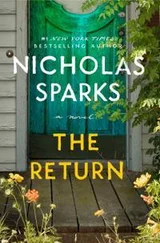At first, Travis didn’t believe it. Truth be told, he wasn’t even positive it was the same bird. Who could tell? Gray and white and black with dark, beady eyes—and, okay, most of the time a pest—they all looked pretty much alike. And yet, staring at it . . . he knew it was the same bird. It had to be. It paced back and forth, showing no fear of Travis when he approached the glass, and it had a coo that sounded . . . familiar somehow. A million people could tell him he was crazy, and part of him would know they were right, but still . . .
It was the same pigeon, no matter how crazy it sounded.
He watched it in wonder, amazed, and the following day, he brought some Wonder Bread and scattered a few pieces on the sill. After that, he glanced at the window regularly, waiting for the pigeon to reappear, but it never did. In the days following its visit, he found himself depressed by its absence. Sometimes, in fanciful moments, he liked to think that it had simply come to check on them, to make sure Travis was still watching over Gabby. Either that, he told himself, or it came to tell him not to give up hope; that in the end, his choice had been correct.
On the back porch, remembering that moment, he marveled that he could stare out at his happy daughters and experience so much of their joy himself. He barely recognized this sense of well-being, the feeling that all was right in the world. Had the appearance of the pigeon heralded the changes that took hold of their lives? He supposed it was only human to wonder about such things, and Travis figured that he’d be telling the rest of the story as long as he lived.
What happened was this: It was midmorning, six days after the pigeon had reappeared, and Travis was working at the clinic. In one room was a sick cat; in another, a Doberman puppy needing shots. In the third room, Travis was suturing a mutt—half Labrador, half golden retriever—that had received a gash while crawling through barbed wire. He finished the final stitch, tied off the knot, and was about to tell the owner how to keep the gash from getting infected when an assistant entered the room without knocking. Travis turned in surprise at the interruption.
“It’s Elliot Harris,” she said. “He needs to talk to you.”
“Can you take a message?” Travis asked, glancing at the dog and its owner.
“He said it can’t wait. It’s urgent.”
Travis apologized to the client and told the assistant to finish up. He walked to his office and closed the door. On the phone was a flashing light signaling Harris on hold.
Thinking back, he wasn’t sure what he’d expected to hear. He did feel, however, something ominous as he raised the receiver to his ear. It was the first—and the only—time Elliot Harris had ever called him at the office. He steadied himself, then pressed the button.
“Travis Parker speaking,” he said into the phone.
“Dr. Parker, it’s Elliot Harris,” the director said. His voice was calm and unreadable. “I think you should come down to the nursing home as quickly as you can.”
In the short silence that followed, a million thoughts raced through Travis’s mind: that Gabby had stopped breathing, that she’d taken a turn for the worse, that somehow all hope had been lost. In that instant, Travis gripped the phone as if trying to ward off whatever might come next.
“Is Gabby okay?” he finally asked, the words sounding choked.
There was another pause, probably only a second or two. A blink of an eye that was years in the making, is the way he described it now, but the two words that followed made him drop the phone.
He was eerily calm as he left his office. At least, that’s what his assistants would tell him later: that in looking at him, he gave no clues as to what had happened. They said that they’d watched as he drifted past the front desk, oblivious to those who were watching him. Everyone, from the staff to the owners who’d brought their animals to the clinic, knew that Travis’s wife was in the nursing home. Madeline, who was eighteen and worked at the front desk, stared at him with wide eyes as he approached her. By that point, nearly everyone in the office knew that the nursing home had called. In small towns, news is nearly instantaneous.
“Would you call my dad and tell him to come in?” Travis asked. “I have to go to the nursing home.”
“Yes, of course,” Madeline answered. She hesitated. “Are you all right?”
“Do you think you could drive me? I don’t think I should be behind the wheel right now.”
“Sure,” she said, looking frightened. “Just let me make the call first, okay?”
As she punched the number, Travis stood as if paralyzed. The waiting room was silent; even the animals, it seemed, knew something had happened. He heard Madeline speaking to his dad as if from a great distance; in fact, he was only dimly aware of where he was. It was only when Madeline hung up the phone and told him that his father would be right in that Travis seemed to recognize his surroundings. He saw the fear on Madeline’s face. Maybe because she was young and didn’t know better, she asked the question that everyone seemed to be thinking.
“What happened?”
Travis saw empathy and concern etched on their faces. Most of them had known him for years; some had known him since he was a child. A few, mostly the staff, knew Gabby well and, after the accident, they had gone through a period that almost resembled mourning. It wasn’t anyone’s business and yet it was, because his roots were here. Beaufort was their home, and looking around, he recognized everyone’s curiosity as something akin to familial love. Yet he didn’t know what to say to them. He’d pictured this day a thousand times, but now, however, everything was blank. He could hear himself breathing. If he concentrated hard enough, he believed that he would even be able to feel his heart beating in his chest; but his thoughts seemed too far away to grasp, let alone put into words. He wasn’t sure what to think. He wondered if he’d heard Harris correctly or if it had all been a dream; he wondered if he’d somehow misunderstood. In his mind, he replayed the conversation, hunting for hidden meanings, trying to grasp the reality behind the words, but try as he might, he couldn’t seem to focus long enough to even feel the emotion he was supposed to. Terror kept him from feeling anything at all. Later, he would describe the way he was feeling then as like being on a teeter-totter, with ultimate happiness on one end and ultimate loss on the other, while he was stuck in the middle, his legs on both sides, thinking that a single wrong move in either direction would send him tumbling off.
In the clinic, he put his hand on the counter to steady himself. Madeline rounded the counter with her keys dangling. Travis looked around the waiting room, then at Madeline, then at the floor. When he raised his eyes, all he could do was mimic exactly what he’d heard on the phone only moments before.
“She’s awake,” he finally said.
Twelve minutes later, after thirty lane changes and three traffic lights that were definitely yellow and perhaps even red, Madeline brought Travis to a halt at the entrance to the nursing home. He hadn’t said a word since he’d been in the car, but he smiled his thanks as he pushed open the car door.
The drive had done nothing to clear his mind. He hoped beyond hope and was excited beyond all measure; at the same time, he couldn’t shake the thought that somehow he’d misunderstood. Maybe she woke for an instant and was in a coma again; maybe someone had gotten the information wrong in the first place. Maybe Harris had been referring to some obscure medical condition that improved brain function, rather than the obvious. His head spun with alternating scenarios of hope and despair as he made his way toward the entrance.
Читать дальше











![Николас Спаркс - Каждый вдох [litres]](/books/414723/nikolas-sparks-kazhdyj-vdoh-litres-thumb.webp)
